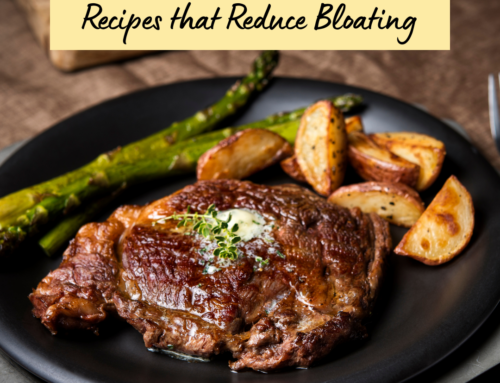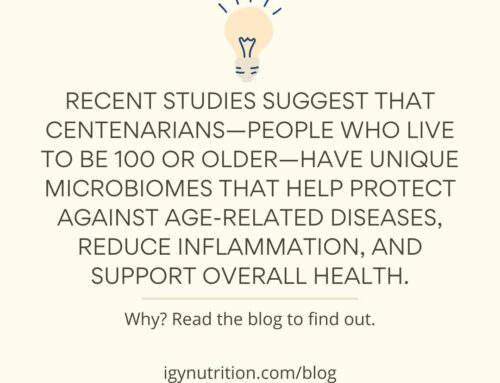Today, we’ll discuss how to tackle iron deficiency (and how to get enough iron in your diet). We recommend reading part one of this blog series before jumping into this one, but here’s a quick recap:
Recap: How Iron Affects the Body
Iron is an essential nutrient. We rely on iron for the proper transport of oxygen to our cells. A lack of oxygen can lead to tiredness, lightheadedness, and many other symptoms. Without enough iron, we become iron-deficient anemic, which can cause various symptoms, including fatigue, lightheadedness, impaired thyroid function, hair loss, body composition changes, impaired immune function, and more.
Though there isn’t much research regarding iron deficiency’s direct effects on gut health, there is ample evidence that iron deficiency impairs immune function. And an impaired immune system is shown to detriment gut health by putting one at risk of developing nasty symptoms of dysbiosis, like bloating, gas, and irregular motility.
To determine if you’re iron deficient, you’ll want to test your serum ferritin levels (a blood test). Why ferritin and not iron? Think of ferritin as the storage form of iron. If your body lacks stored iron (ferritin), that’s typically a sign of iron deficiency.
If you have symptoms of iron deficiency but fall on the low end of the healthy ferritin range, say 40 ng/mL and under, safely attempting to increase it may benefit you. Some people feel better with more iron available to their bodies. It may be worth a shot, at least.
We strongly encourage you to work with a healthcare professional to help you manage your iron deficiency (or to find out if you have one in the first place). However, we understand that many of you do not have access to one.
Read on to find out how to handle iron deficiency safely.
Iron-Rich Foods
Consuming plenty of iron-rich foods is key to any well-rounded diet, but it’s crucial for those struggling with iron deficiency.
Let’s take a look at some iron-rich staples below (1):
- Red meat
- Spinach
- Tofu
- Iron-enriched breakfast cereals
- Beans
- Pumpkin seeds
- Oysters
- Mussels
- Chicken liver
You might think – I eat many of these foods quite often, but my iron is still low. You may struggle to absorb iron from your food, which is especially common among those with poor gut health (2).
Many doctors and dietitians combat iron deficiency by having their patients eat iron-rich foods and foods high in vitamin C simultaneously.
Pairing iron-rich foods with foods high in vitamin C may help to mitigate poor iron absorption. Vitamin C “facilitates iron absorption by forming a chelate with ferric iron at acid pH that remains soluble at the alkaline pH of the duodenum -” meaning it makes iron much easier for your digestive system to absorb (3).
Let’s take a look at some sample meals that are high in both iron and vitamin C (4):
- Ground beef with sauteed red pepper and rice
- Tofu stir fry including spinach, eggs, and tomatoes
- Iron-enriched breakfast cereal with pumpkin seeds and strawberries on top
- Rice and beans with sauteed red pepper
Does that not sound too appetizing to you? Supplementation may be the best route for picky eaters and those on the go.
Supplementation
Before you jump into iron supplementation, please read this: consuming too much iron at once can be dangerous (7). It is imperative to follow the serving size directions on the bottle. Downing an entire bottle of iron supplements in a week will not fix your deficiency – instead, it will give you a lot of digestive tract pain.
Okay, with that word of warning out of the way, let’s talk about supplementation. There are several forms of iron on the average drug store shelf, but 65 mg of ferrous sulfate (a form of iron) taken with 500 mg of vitamin C per day seems to be most effectively absorbed (5).
However, watch out – don’t take your iron supplement at the same time you take any calcium-rich supplement. Calcium seems to inhibit iron absorption (6).
If supplementation and a change in diet do not fix your deficiency, you’ll want to speak to a doctor. They may be able to prescribe you an iron infusion, during which your body is provided a form of iron intravenously (into your blood through your veins).
Takeaway: Fixing Iron Deficiency With Diet and Supplementation
If you have symptoms of iron deficiency, safely attempting to increase your ferritin levels may benefit you. We strongly encourage you to work with a healthcare professional to help you manage your iron deficiency (or to find out if you have one in the first place). However, we understand that many of you do not have access to one.
Consuming plenty of iron-rich foods is key to any well-rounded diet, but it’s crucial for those struggling with iron deficiency. Many doctors and dietitians combat iron deficiency by having their patients eat iron-rich foods and foods high in vitamin C simultaneously. That’s because vitamin C makes iron much easier for your digestive system to absorb.
Supplementation may be the best route for picky eaters and those on the go. But before you jump into iron supplementation, please read this: consuming too much iron at once can be dangerous (7). It is imperative to follow the serving size directions on the bottle.
There are several forms of iron on the average drug store shelf, but 65 mg of ferrous sulfate (a form of iron) taken with 500 mg of vitamin C per day seems to be most effectively absorbed. Remember not to take your iron supplement at the same time you take any calcium-rich supplement. Calcium seems to inhibit iron absorption.
Thanks for joining us today! Tag us in photos of your iron-rich meals on Instagram @igynutrition. See you next time!
References
- https://www.nal.usda.gov/legacy/sites/default/files/iron_0.pdf
- https://www.ncbi.nlm.nih.gov/pmc/articles/PMC7400826/#:~:text=Inflammatory%20bowel%20disease%20leads%20to,commensal%20microbiota%20bacteria%20%5B71%5D.
- https://pubmed.ncbi.nlm.nih.gov/6940487/#:~:text=Ascorbic%20acid%20facilitates%20iron%20absorption,combat%20nutritional%20iron%20deficiency%20anemia.
- https://ods.od.nih.gov/factsheets/VitaminC-HealthProfessional/#h3
- https://www.pharmacytimes.com/view/iron-supplements-treating-iron-deficiency-anemia
- https://pubmed.ncbi.nlm.nih.gov/21462112/#:~:text=Studies%20on%20human%20subjects%20have,at%20risk%20of%20Fe%20deficiency.
- https://ods.od.nih.gov/factsheets/Iron-Consumer/#:~:text=the%20underlying%20disease.-,Can%20iron%20be%20harmful%3F,pain%2C%20vomiting%2C%20and%20diarrhea.




